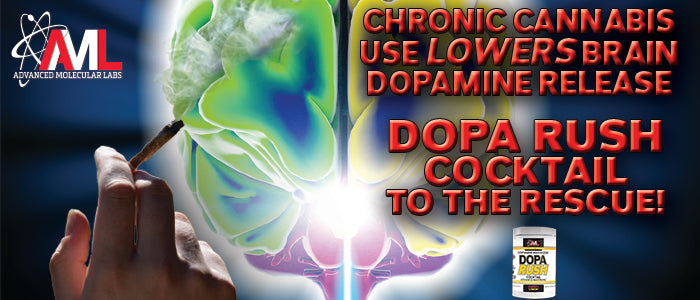


Cannabis Brain Effects: Dopamine & Cognitive Function Insights
DOPA RUSH COCKTAIL™ to the Rescue!
By Steve Blechman
Dopamine is a neurotransmitter, a brain chemical that helps send signals between nerve cells. It has vital roles influencing divergent functions within the human body that range from mental acuity, psychological well-being to overall vitality. Increasing dopamine has been shown to increase energy, focus, memory, alertness, attention, confidence, mood, motivation, libido, weight control, and creativity. New research indicates that smoking too many joints could cause lasting cognitive impairment, impacting cognitive function and brain health. Understanding cannabis brain effects is crucial as they can significantly alter cognitive abilities and overall brain health.
A new study reported in ScienceDaily on August 7, 2019, "Provides the first evidence of a blunted response to stress-induced dopamine signaling in the brains of prefrontal cortex in individuals at high risk for psychosis who regularly use cannabis."
Also, research has found a connection between excessive cannabis use and decreased dopamine levels in the brain, which could lead to impaired memory, attention, and problem-solving abilities. These cannabis brain effects are crucial to understanding the risks involved. A new study published in Molecular Psychiatry found evidence of a "compromised dopamine system" in heavy pot smokers, with significantly lower dopamine levels for those heavily dependent on cannabis. This highlights the importance of recognizing dopamine addiction as a potential risk for users.
"In light of the more widespread acceptance and use of marijuana, especially among young people, we believe it is important to look more closely at the potentially addictive effects of cannabis on key regions of the brain," said Anissa Abi-Dargham, M.D., a professor at Columbia University Medical Center and an author of the paper.
Researchers looked at adults between the ages of 21 and 40 who were severely dependent on cannabis, and a group of healthy control subjects. Positron emission tomography (PET) was used to examine the level of dopamine released in the striatum of heavy pot smokers. The striatum is a region of the brain that is involved in working memory, impulse behavior, and attention. Compared to the controls, the cannabis users had significantly lower dopamine release in the striatum, including areas involved in associative and sensorimotor learning. "Long term, heavy cannabis use may impair the dopaminergic system, which could have a variety of negative effects on learning and behavior," Abi-Dargham said. This research underscores the need for brain health supplements to support cognitive function and counteract these effects.
Previous studies have shown that addiction to other potentially abusive drugs, such as cocaine and heroin, have similar effects on dopamine release. This highlights the potential for dopamine addiction. However, evidence linking cannabis to lower dopamine release has been lacking until now.
Cannabidiol (CBD) and tetrahydrocannabinol (THC) are the two most abundant cannabinoids found in the marijuana plant, with THC containing approximately 12% to 25% and CBD containing 1.4%. People who use THC regularly lower their dopamine levels. CBD is an adenosine activator and it also doesn't include the psychotropic effects of THC. CBD recently has been shown to also potentially inhibit dopamine release by inhibiting the TRPV-1 receptor in the brain (Nueropharmacology, 2019). The spice black pepper extract containing piperine has been shown to activate the TRPV-1 receptor and enhance dopamine release.
One solution to combat dopamine deficiency and boost dopamine levels, besides going easier on the weed, is the breakthrough product Dopa Rush Cocktail™ from Advanced Molecular Labs (AML). Dopa Rush Cocktail™ is the most potent dopamine-maximizing supplement on the market. As a leader among dopamine supplements, it uses a scientifically backed formula to increase mental alertness, focus, clarity, and energy. No crash, no jitters—just enhanced mood, creativity, and motivation. Dopa Rush Cocktail™ is designed for students, athletes, and motivated professionals for a mental edge in the office, in class, or even in the gym.
For more information on Dopa Rush Cocktail™, which serves as a natural dopamine booster, go to www.advancedmolecularlabs.com

References:
1. Christin Schifani, Jens Pruessner, Huai‐Hsuan Tseng, Naren Rao, Abanti Tagore, Alan A. Wilson, Sylvain Houle, Pablo M. Rusjan, Romina Mizrahi. Stress‐induced cortical dopamine response is altered in subjects at clinical high risk for psychosis using cannabis. Addiction Biology, 2019; DOI: 10.1111/adb.12812
2. Wiley. "Cannabis' effects on brain neurochemistry." ScienceDaily. ScienceDaily, 7 August 2019. <www.sciencedaily.com/releases/2019/08/190807092348.htm
3. University of California - Davis. Brain molecule identified as key in anxiety model: Study of nonhuman primates lays groundwork for new strategies in treating anxiety disorders. ScienceDaily, 14 August 2019. www.sciencedaily.com/releases/2019/08/190814161816.htm
4. Evan de Giessen, J J Weinstein, C M Cassidy, M Haney, Z Dong, R Ghazzaoui, N Ojeil, LS Kegeles, X Xu, NP Vadhan, ND Volkow, M Slifstein, A Abi-Dargham. Deficits in striatal dopamine release in cannabis dependence. Molecular Psychiatry, 2016; DOI: 10.1038/mp.2016.21
5. Columbia University Medical Center. Heavy cannabis use associated with reduced dopamine release in brain: Effect similar to other addictions. ScienceDaily, 14 April 2016. www.sciencedaily.com/releases/2016/04/160414214826.htm
6. Tobias U Hauser, Eran Eldar, Nina Purg, Michael Moutoussis, Raymond J Dolan. Distinct roles of dopamine and noradrenaline in incidental memory. Journal of Neuroscience 12 August 2019, 0401-19; DOI: 10.1523/JNEUROSCI.0401-19.2019
7. Honor Whiteman. Medical News Today.com Marijuana and mental illness low dopamine levels may play a role. Monday, November 21, 2016.
8. Bloomfield MA, Ashok AH, Volkow ND, Howes OD. The effects of Δ9-tetrahydrocannabinol on the dopamine system. Nature 2016;539(7629):369-377. doi:10.1038/nature20153
9. Lizzie Wade. Hardcore pot smoking could damage the brain's pleasure center. July 14, 2014. https://www.sciencemag.org/news/2014/07/hardcore-pot-smoking-could-damage-brains-pleasure-center
10. Cannabidiol attenuates the rewarding effects of cocaine in rats by CB2, 5-TH and TRPV1 receptor mechanisms. Neuropharmacology. DOI 10.1016/j.neuropharm.2019.107740



